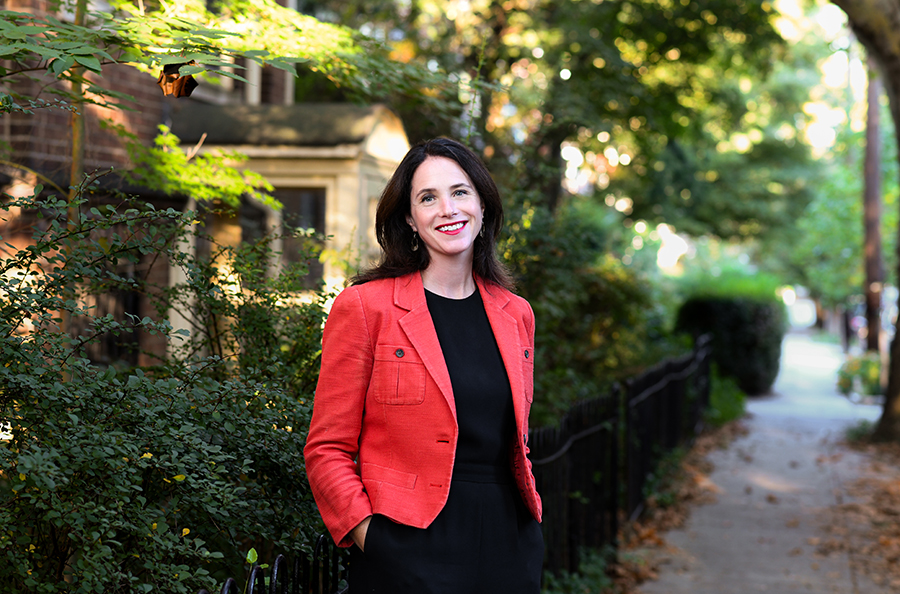Margie Wakelin

Teach For America Mississippi Delta, 2002
Senior Attorney in the Philadelphia office of the Education Law Center
Great teachers effect change everyday, but to make sure those teachers get the support they need, systemic change is required. Margie Wakelin, senior attorney at the Education Law Center in Pennsylvania, just learned how significant a change you can make when you put your mind to it. As part of a team of lawyers representing school districts, parents, and students from across the Commonwealth, as well as two statewide organizations, she just won a transformative court case that could reshape education in Pennsylvania for years to come, making it more equitable for everyone.
In some ways, Wakelin was born for this moment. Her mom was a teacher, and her dad was a lawyer. They sent her to good schools, ones that featured life-changing lessons on historic inequity as part of her education, even going so far as to look at how specific rural, urban and Indigenous communities were underserved by their respective school systems. She embraced those lessons.
“I’ve always had a sense of justice, but I realized I really wanted to work to ensure that our public education system was providing the opportunities that we said we were providing as a nation, in terms of the American dream and education being a tool for social mobility,” Wakelin says. Her work in the law began early: While attending college in North Carolina as an out of state student from Maine, she successfully organized other students to fight against raising in-state tuition.
Real World Experience
While she knew she had a passion for policy, she also knew that if she was going to have a career in some fashion in the education field, she should have experience teaching.
“I knew that working in schools and being a teacher was the first step, that I needed to understand what that experience was like,” she says. So she applied to be a special education teacher with Teach For America, serving students in the Mississippi Delta from 2002 to 2005.
There, she not only learned skills as an educator–she began to see the need for advocacy regarding children’s education. Her high school students shared with her that their elementary school didn’t provide students in special education programs with full days of education, even having elementary students spend time doing maintenance projects around the school, instead of receiving instruction.
Wakelin worked incessantly to make sure her students instead received the instruction they were entitled to. She was also inspired to gain skills in order to advocate for students in other ways. She applied to law school and became a lawyer, then joined Equip for Equality, a disability rights legal services organization in Chicago, before moving to Pennsylvania and taking her position at the Education Law Center.
Taking on the Case
While she now serves students with disabilities in courtrooms rather than classrooms, recently, her support extended to all students in Pennsylvania through a landmark fair funding case. Wakelin’s team presented evidence in court that Pennsylvania’s education system is unconstitutional. Since the state requires schools to rely too heavily on local funding rather than state funding, our education system is wildly disparate in quality depending on where you live, according to Wakelin and her team.
“Our schools are hyper-segregated,” Wakelin says. “Students in low-wealth districts are disproportionately harmed, and we’re working to address that.” The Pennsylvania school funding system is one of the most regressive systems in the U.S., according to Wakelin.
Fortunately, it will be more equitable in the near future–Wakelin and her team won the case in a decisive 786-page ruling that state officials decided not to appeal.
“On a personal level, it was certainly one of the most thrilling parts of my career,” Wakelin says. “There are a lot of times when you do this work–I think anyone in education can say this–there are a lot of times when you work extremely hard, and there still continues to be significant injustice or heartbreak. But this was an example of where we worked extremely hard, and we achieved that goal.”
Now, they’re working on creating a proposal for a more equitable model that could reshape education in Pennsylvania. And because insufficient funding often correlates with insufficient support for students with disabilities, it’s a victory that hearkens back to her first teaching experience in the Mississippi Delta with TFA.
“I’ve had the great, great fortune for the last 15 years, to really be in my dream job of working for students like them,” she says.